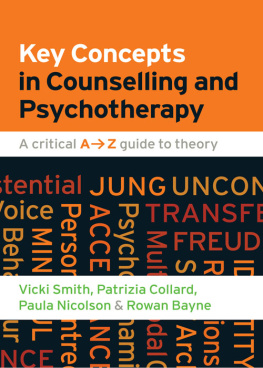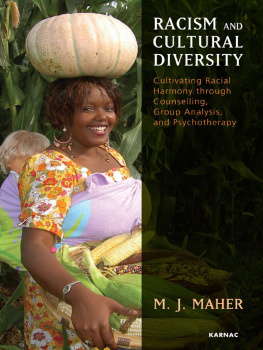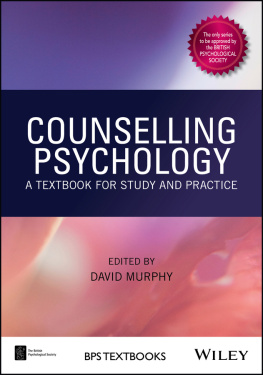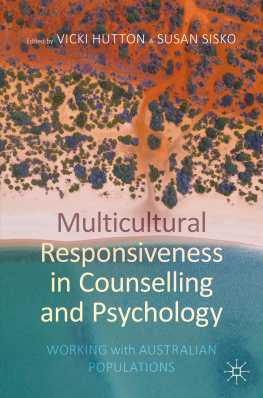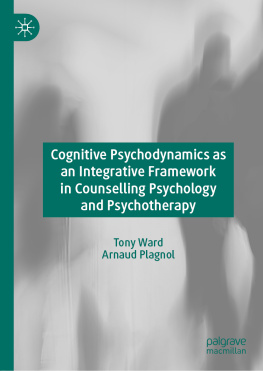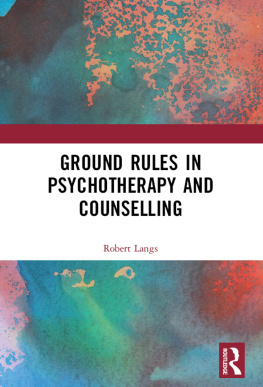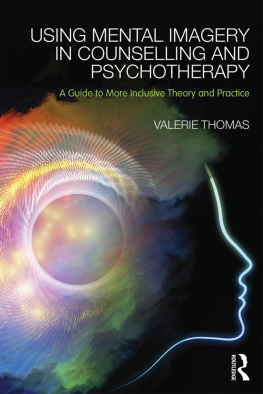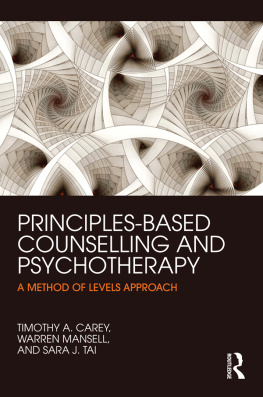This book provides a very good introduction to the key concepts and theories that inform and frame the current psychotherapeutic and counselling landscape. Each author has written on a selection of basic concepts as they are approached in their preferred therapeutic modality, resulting in an exciting and inclusive overview of both old and contemporary psychotherapeutic thought. In addition, each author is mindful of the importance of a critical appraisal of the various concepts and theories. Thus, this book will be extremely useful both for trainees and practitioners.
Dr Anastasios Gaitanidis, Senior Lecturer,
University of Roehampton, London, UK
As well as being an invaluable source of knowledge about all aspects of counselling and psychotherapy, this book is a real pleasure to read. The authors have been able to capture the essence of ideas, traditions and key figures in a way that is accessible and a consistent source of delight and illumination. Highly recommended for anyone wishing to expand their psychotherapeutic horizons.
John McLeod, Emeritus Professor of Counselling,
University of Abertay Dundee, UK
This book does what it says on the tin, it highlights the key concepts and theories in the field of counselling and psychotherapy. It is a systematic and encyclopaedic voyage of all the central constructs in the field. It is very well written, snappy and thorough, but more important, it serves a vital need of putting in one place all the theories and concepts needed by anyone interested in counselling and psychotherapy.
Cary L. Cooper, CBE, Professor of Organizational
Psychology and Health, Lancaster University,
UK and President of BACP
This is an invaluable guide for anyone wanting easily accessible information about counselling theory and practice. It will be as useful to trainees sitting as counsellors, as to experienced practitioners wanting to update their knowledge on the latest thinking.
Tim Bond, University of Bristol, UK

Open University Press
Open University Press
McGraw-Hill Education
McGraw-Hill House
Shoppenhangers Road
Maidenhead
Berkshire
England
SL6 2QL
email: enquiries@openup.co.uk
world wide web: www.openup.co.uk
and Two Penn Plaza, New York, NY 10121-2289, USA
First published 2012
Copyright Vicki Smith, Patrizia Collard, Paula Nicolson and Rowan Bayne, 2012
All rights reserved. Except for the quotation of short passages for the purpose of criticism and review, no part of this publication may be reproduced, stored in a retrieval system, or transmitted, in any form or by any means, electronic, mechanical, photocopying, recording or otherwise, without the prior written permission of the publisher or a licence from the Copyright Licensing Agency Limited. Details of such licences (for reprographic reproduction) may be obtained from the Copyright Licensing Agency Ltd of Saffron House, 610 Kirby Street, London EC1N 8TS.
A catalogue record of this book is available from the British Library
ISBN-13: 978-0-33-524221-4 (pb)
ISBN-10: 0-33-524221-9 (pb)
eISBN-13: 978-0-33-524222-1
Library of Congress Cataloging-in-Publication Data
CIP data applied for
Typesetting and e-book compilations by
RefineCatch Limited, Bungay, Suffolk
Printed in the UK by Bell & Bain Ltd, Glasgow
Fictitious names of companies, products, people, characters and/or data that may be used herein (in case studies or in examples) are not intended to represent any real individual, company, product or event.

Contents
Collaborative empiricism
G
Mindfulness-based cognitive therapy (MBCT)
Q
V
Vicki Smith is Senior Lecturer in Counselling Studies at the University of Huddersfield. She has previously worked with young people as a counsellor and careers counsellor as well as in training and consultancy roles. Her present research focuses on the impact of the student/tutor alliance on the quality of the learning experience.
Dr Patrizia Collard is an international Mindfulness Educator, Writer, Psychotherapist and Coach in private practice and Senior Lecturer for Integrative Psychotherapy (Department of Psychology) at the University of East London. She has worked and lived in Vienna, Wales, England, Hong Kong and China and taught in Austria, the UK, the Greece, Spain and Slovenia.
Paula Nicolson is Emeritus Professor of Social Health Psychology at the University of London (Royal Holloway). She is now working as a freelance organizational consultant using psychodynamic and systemic approaches and completing a postgraduate diploma in psychodynamic couple counselling and psychotherapy. She is the author of numerous books and articles.
Rowan Bayne is Emeritus Professor of Psychology and Counselling at the University of East London where he was a core tutor on counselling and psychotherapy courses for over 30 years. He has also run courses for many major organizations such as British Rail, the BBC, the City of London and Warwick University and has written several books on personality and counselling.
Vicki would like to thank Paul for his support during the writing of this book, particularly in the latter stages when the pressure was on! Also thanks to Rowan who was always willing to discuss issues as they arose and to offer suggestions based on his wealth of experience.
Patrizia would like to thank Bernhard, my rock and Dan and Toby, my lights. Many heartfelt thanks to Vicki Smith for her patience, encouragement and support.
Paula would like to acknowledge the continued inspiration and support of colleagues and friends from D10 at the Tavistock Clinic as well as from Derry and Kate Nicolson and Malachi and Azriel Annon-Nicolson.
Rowan would like to thank Katherine Bayne and my colleagues and students very warmly. You have contributed so much to my understanding and enjoyment of applied personality theory and counselling.
All the authors would like to say a big thank you to Monika Lee, Richard Townrow, Bryony Skelton and Claire Munce at McGraw-Hill for their support during the writing and publication of this book. They were always there to answer queries and to help us remain focused, particularly during the more demanding phases of the writing process.
The aim of this book
The principal aim of this book is to provide a concise, user-friendly introduction to some of the main ideas in counselling and psychotherapy. It is likely to be most suitable for students on undergraduate courses, those embarking on training courses and for practitioners wanting to refresh themselves about certain aspects relevant to their work. Our intention is that you will be able to dip into the book in order to obtain some accessible, relatively brief but, hopefully, insightful information about a particular concept, whether it is a the-oretical perspective or term, a central technique or a leading figure in the counselling or psychotherapy field.
We are not setting out to provide a comprehensive handbook on counselling and psychotherapy as there are a number of extremely valuable ones available already. Nor are we aiming to offer a practical guide covering elements relevant to practice in a how to type format. Although some important techniques are included they have mainly been selected in order to elucidate a par-ticular theoretical standpoint rather than to clarify how they may be used in practice.
Next page
